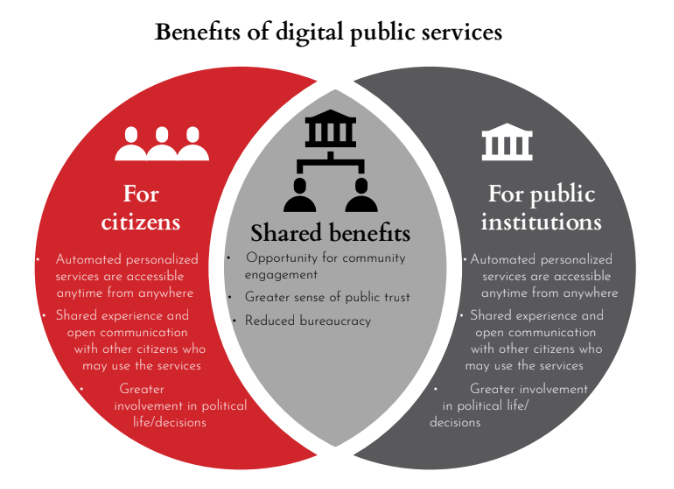Digitalization of government services in the post-pandemic world

Image source: Nirutistock from Getty Images | Canva
“What you should see is an exponential improvement in the quality of service. You will have proactive service delivery. You will have the best quality output that will make you feel like the government understands you, that it feels you, that it serves tailor-made services for you specifically as an individual. That is the impact of AI in your life.” – The UAE Minister for Artificial Intelligence Omar Al Olama, via Euronews.com
The COVID-19 pandemic has emphasized the discourse about the importance of digital transformation to the survival of an organization, especially in the public and government sector. At the World Government Summit 2022, it was evident that digital government has become a top priority as governments worldwide try to keep up with technological advancements and rapid change.
Digitalization provides more efficient and high-quality services and boosts communication between governments and citizens. The three most captivating qualities of a digital government are its capacity for effective service delivery, affordable scaling, and quick adaptation. Many large-scale digital innovations from telemedicine to telework, as well as from virtual courts to virtual education were implemented to aid the needs of the citizens and maintain government services. These initiatives show how relevant digitalization is now more than ever.
Despite the progress made by many governments, reaching a mature level of digitalization is not an easy endeavor. The development efforts of countries under unusual circumstances are still being hampered by persistent problems, especially in the least developed countries. For instance, in Africa, the price of mobile broadband connections remains extremely high relative to per capita gross national income making e-government developmental initiatives compromised.
From analog government to digital government
The digitization of government operations and public services—the switch from analog to electronic governance—has advanced dramatically during the past few decades. Governments have attempted to modernize their working practices through extensive public sector reforms to accommodate new technologies and citizen needs.
In the public sector, digital transformation plays a significant role in enhancing the potential of community participation, as well as process efficiency improvements in government organizations. Giving citizens a voice and the opportunity to participate in and work on governance increases public trust, and meeting evolving customer service needs remains a top priority.
Denmark recently introduced an e-participation initiative where individuals can suggest new legislation through the use of electronic petitions. The Danish parliament oversees the Borgerforslag (https://www.borgerforslag.dk/) initiative, which translates exactly to “citizen proposal.” As of now, this project already received a total of over 1400 proposals. The program is open to everybody who is eligible to vote in general elections in Denmark. They can propose, evaluate, and vote on proposals in the portal for the changes they believe the government or society should address. The proposal may be submitted as a motion for resolution if it is supported by 50,000 eligible voters in the general election.
In discussing digitalization in the government, e-government and digital government are two concepts that should be defined. Although these two ideas are commonly combined, they nevertheless refer to separate notions. E-government is described as the government’s use of Information and Communication Technologies (ICTs) to improve public services in the “E-Government Services Adoption: An Extension of the Unified Model of Electronic Government Adoption,” a study led by Isaac Kofi Mensah in 2020. Moreover, e-government deepens citizens’ connections to their government and promotes greater citizen involvement in the decision-making process. E-government aims to advance the effectiveness and transparency of the government by delivering services faster and cost-effectively and empowering citizens through participatory governance.
The idea of digital governance signifies a fundamental change in how governments globally are approaching their role. Governments are transforming how they use the power of information technologies: from establishing quantifiable administrative objectives to enhancing the provision of public services, from data-driven decision-making to implementing evidence-based regulations, and from providing more accountability and transparency within the government to boost public trust.
Furthermore, digital government services save employees’ time for bigger projects and reduce the production time and materials for the public services. According to GovOS, an organization that provides “innovative solutions and industry-leading services” to governments, digital government services, such as business license renewals, fishing license applications, and filing tax returns, do not require manual manpower to process an application. This allows the employee to focus on the more important projects.
Similarly, Secretary-General of the Asian Productivity Organization (APO) Dr. AKP Mochtan mentioned in the Digitalization of Public Service Delivery in Asia report that the delivery of public services can change from “being reactive to citizens’ needs to becoming proactive to anticipate future needs” as a result of the use of digital technologies.
Realizing the opportunities demands a paradigm shift in the use of digital technologies and data within governments, from e-government to digital government. In an effort to increase efficiency, an e-government approach sees technology as the answer for digitizing the delivery of an existing analog process. It puts emphasis on its implementation. In contrast, digital government practices place less emphasis on technology and more on re-engineering and revamping services and procedures to satisfy user needs. The establishment of digital-by-design cultures, which alter organizational behavior, goes hand in hand with this digitalization.
Benefits of digital public services
When properly implemented, e-government makes it possible for individuals, businesses, and organizations to connect with the government more conveniently, promptly, and affordably. The potential savings in expenses are also enormous. According to the European Commission, electronic billing in Denmark saves businesses and taxpayers a combined €200 million annually. Savings might reach $50 billion annually if implemented all over Europe. Meanwhile, e-procurement systems in Italy reduced expenses by nearly €3 billion.
E-Government results in increased internal productivity and efficiency of government workers, having more time for critical duties rather than more time-consuming tasks like filing reports or paperwork manually. It also boosts better cross-departmental collaboration since key documents are shared and can be easily found in a digital repository. Digital government services can lessen paper-based workflows that save governments money and benefit the environment. This will also result in decreased labor expenses.
Governments may accomplish more with fewer resources and provide greater services to their citizens using digital government services instead of sticking with conventional ones. These digital services for the government can also promote transparency and strengthen ties between the public and its governing body when any suspicion appears.
The conventional approach to service delivery entails several paper-based procedures, a minimal to no understanding of the business processes, a significant time and labor commitment, and no public access to the data collected. The advantages of digital government services not only assist in solving all of these challenges. But they also strengthen the bond between governments and their constituents.

Drivers and challenges
In times of social distance, the digital government has also played a crucial role in enabling public institutions to continue to be available and functional so they can meet citizens’ requirements. Only the governments in the region with the appropriate digital infrastructure have been able to provide services like transferring resources to people in need, distance learning for students, telemedicine, and the distribution of basic information on plans, strategies, and policies during the pandemic.
Governments increased their digital journey to meet their constituents’ needs by expanding digital infrastructure through automation and artificial intelligence, utilizing cloud-based services, and building a digital architecture for the entire government. Moreover, the government makes the public sector workforce more digital and invests in the interconnectedness of citizens to accelerate digitization during the pandemic.
In the coming years, a number of countries plan to considerably boost the amount they spend on digital infrastructure. The “digital divide” between the most and least connected communities will be addressed by investments in updating technology infrastructure and establishing fiber networks to boost internet access. As part of the Digital Spain 2025 initiative, the Spanish government plans to invest €20 billion in digital infrastructure in the next three years, with an additional €50 billion coming from private sources. The French government plans to invest €7 billion in digital projects, including modernizing public information systems and stepping up initiatives to include older individuals online.
In Thailand, 5G networks have facilitated cooperation between the public and private sectors and are a key part of the government’s Thailand 4.0 digital recovery plan. In a similar manner, the Scottish Government committed £4 million in financing as part of the Scotland 5G Connect Program for the construction of a number of hubs that would roll out 5G services throughout the nation. In addition, the Australian government invested over $21.2 million in commercial 5G trials and testbeds across important industry sectors to speed up the implementation.
Meanwhile, the United States has a reputation for being a leader in digital government services. Based on The KPI Institute’s Government Services Index (GSI) 2022, the United States is the top performer in the Digitalization dimension. The GSI 2022 report compiles and ranks 66 countries around seven regions in the world based on their performance in different dimensions and indicators. It highlights the Digitalization dimension, which refers to the significance of technology and redefining ways in how residents and public services interact.
The United States started its e-government journey two decades ago when the country published The E-Government Act of 2002. Its goal was to foster the utilization of the internet and new technologies across government agencies, as well as the provision of citizen-centric government information and services. The United States Digital Service (USDS), whose goal is to provide a better government experience, was also established.
This article was first published in the 24th printed edition of PERFORMANCE Magazine. You can get a free digital copy from the TKI Marketplace here or purchase a print copy from Amazon for a nominal fee here.

Tags: digital government, digitalization, Government





